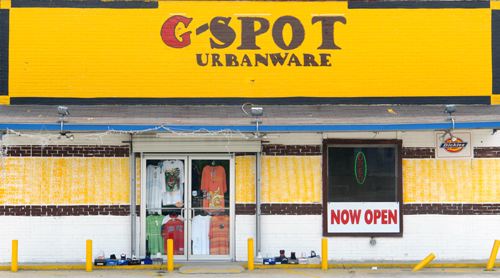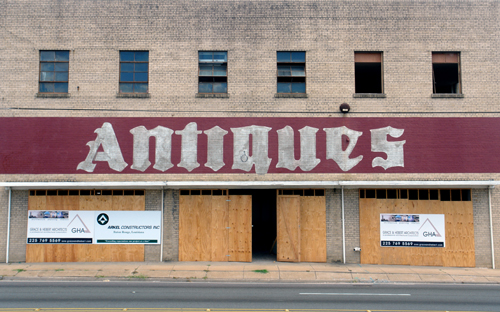Vernacular Baton Rouge: G-SPOT URBANWARE

I’ll tell you everything
“In a lot of books I read, the writer seems to go haywire every time he reaches a high point. He’ll start leaving out punctuation and running his words together and babble about stars flashing and sinking into a deep dreamless sea. And you can’t figure out whether the hero’s laying his girl or a cornerstone. I guess that kind of crap is supposed to be pretty deep stuff—a lot of the book reviewers eat it up, I notice. But the way I see it is, the writer is just too goddam lazy to do his job. And I’m not lazy, whatever else I am. I’ll tell you everything.”
—Jim Thompson, The Killer Inside Me, 1952.
the alabaster sand
“Under the hooves of the horses the alabaster sand shaped itself in whorls strangely symmetric like iron filings in a field and these shapes flared and drew back again, resonating upon that harmonic ground and then turning to swirl away over the playa. As if the very sediment of things contained yet some residue of sentience. As if in the transit of those riders were a thing so profoundly terrible as to register even to the uttermost granulation of reality.”
—Cormac McCarthy, Blood Meridian, 1985.
there is only one plot
“There are thirty-two ways to write a story, and I’ve used them all, but there is only one plot—things are not as they seem.”
—Jim Thompson, quoted in Savage Art, A Biography of Jim Thompson by Robbert Polito, 1995.
through sunlight and through shade
“The following evening as they rode up onto the western rim they lost one of the mules. It went skittering off down the canyon wall with the contents of the panniers exploding soundlessly in the hot dry air and it fell through sunlight and through shade, turning in the lonely void until it fell from sight into a sink of cold blue space that absolved it forever of memory in the mind of any living thing that was.”
—Cormac McCarthy, Blood Meridian, 1985.
purest indigo
“On the day that followed they crossed a lake of gypsum so fine the ponies left no track upon it. The riders wore masks of boneblack smeared about their eyes and some had blacked the eyes of their horses. The sun reflected off the pan burned the undersides of their faces and shadow of horse and rider alike were painted upon the fine white powder in purest indigo.”
—Cormac McCarthy, Blood Meridian, 1985.
Vernacular Baton Rouge: Antiques
 501 Government Street.
501 Government Street.
strands of the night
“They rode on and the sun in the east flushed pale streaks of light and then a deeper run of color like blood seeping up in sudden reaches flaring planewise and where the earth drained up into the sky at the edge of creation the top of the sun rose out of nothing like the head of a great red phallus until it cleared the unseen rim and sat squat and pulsing and malevolent behind them. The shadows of the smallest stones lay like pencil lines across the sand and the shapes of the men and their mounts advanced elongate before them like strands of the night from which they’d ridden, like tentacles to bind them to the darkness yet to come.”
—Cormac McCarthy, Blood Meridian, 1985.
white noon
“In two days they began to come upon bones and cast-off apparel. They saw halfburied skeletons of mules with the bones so white and polished they seemed incandescent even in that blazing heat and they saw panniers and packsaddles and the bones of men and they saw a mule entire, the dried and blackened carcass hard as iron. They rode on. The white noon saw them through the waste like a ghost army, so pale they were with dust, like shades of figures erased upon a board.”
—Cormac McCarthy, Blood Meridian, 1985.
the ‘Sorryno’ Irani restaurant
“Lambajan said nothing, and his silence spread outwards from him, muffling the hooting of taxis, the cigarette-vendor’s cries, the shrieks of street-urchins as they played fighting-kite and hoop and dodge-the-traffic, and the loud playback music emerging from the ‘Sorryno’ Irani restaurant up the hill (so called because of the huge blackboard at the entrance reading Sorry, No Liquor, No Answer Given Regarding Addresses in Locality, No Combing of Hair, No Beef, No Haggle, No Water Unless Food Taken, No News or Movie magazine, no Sharing of Liquid Sustenances, No Taking Smoke, No Match, No Feletone Calls, No Incoming with Own Comestible, No Speaking of Horses, No Sigret, No Taking of Long Time on Premises, No Raising of Voice, No Change, and a crucial last pair, No Turning Down of Volume—It Is How We Like, and No Musical Request—All Melodies Selected Are To Taste of Prop).”
—Salman Rushdie, The Moor’s Last Sigh, 1995.